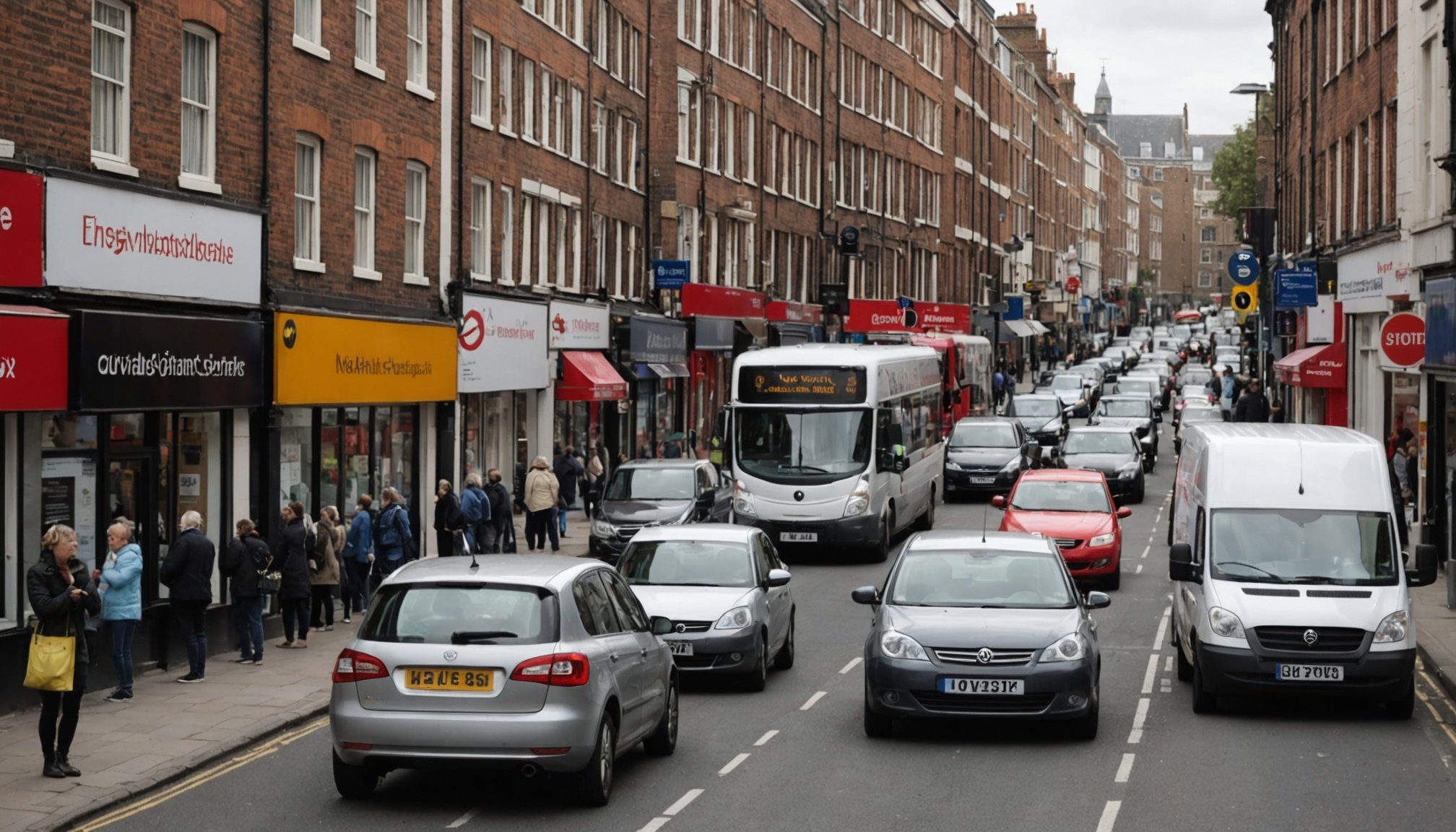Living in bustling urban environments like London can be exhilarating, yet the noise that accompanies city life often goes unnoticed until it starts to affect our health. Noise pollution, particularly from traffic, is a significant environmental concern. Various studies, including those published on PubMed, have provided evidence that prolonged exposure to high levels of noise can lead to serious health issues. This article delves into the impacts of noise pollution on the health of urban residents in the UK, focusing on the effects observed in people living near busy roads or high-traffic areas.
Understanding Noise Pollution and Its Sources
Noise pollution originates from numerous sources, but in urban settings, traffic noise reigns supreme. Major cities like London experience a continuous onslaught of sound from vehicles, construction sites, and public transportation, creating a cacophony that is inescapable. The intensity of this noise contributes to an increased average level of sound exposure that can be detrimental to human health.
Topic to read : What are the most effective dietary changes to reduce the risk of heart disease in the UK population?
Research indicates that noise levels often exceed the recommended limits set by the World Health Organization (WHO). For instance, a study highlighted on PubMed reveals that residents living near busy roads are subjected to noise levels that can average around 70 decibels (dB) during peak traffic hours. This is significant when you consider that levels above 55 dB can start to impact human health adversely.
Moreover, the urban environment amplifies this issue. Dense populations and high traffic volumes lead to an accumulation of noise. As more vehicles fill the roads, the cumulative effect creates an unrelenting background of traffic sounds. This constant noise can lead to a state of chronic stress for residents, as their bodies are continually primed for a fight-or-flight response in reaction to their surroundings.
Topic to read : How can technology be leveraged to improve patient engagement in UK healthcare?
Understanding the sources of noise pollution is crucial to tackling its effects. Identifying locations with high traffic and implementing measures such as noise barriers or soundproofing can significantly reduce the exposure and help improve the overall quality of life for urban dwellers.
Health Impacts of Noise Exposure
Prolonged exposure to noise pollution has been linked to a myriad of health problems. Studies have shown that individuals living in areas with high traffic noise are at a greater risk for heart disease, high blood pressure, and sleep disturbances. These conditions manifest as both physical and mental health issues, showcasing the extensive reach of noise into our lives.
For instance, a comprehensive study found that individuals exposed to high levels of traffic noise were 25% more likely to develop hypertension than those in quieter environments. This is attributed to the body’s stress response; when exposed to loud sounds, our bodies release stress hormones like cortisol, which, over time, can lead to chronic health issues.
Sleep is another critical area affected by noise pollution. Many residents report difficulty sleeping due to traffic sounds, leading to insomnia and other sleep disorders. This lack of restorative sleep can exacerbate mental health issues, including anxiety and depression, creating a vicious cycle of health problems exacerbated by the urban soundscape.
Additionally, the impact of noise on cognitive functions is becoming a focal point of research. Children, in particular, are at risk as studies indicate that high noise levels can interfere with their ability to concentrate and learn. This is particularly concerning in urban environments where children are regularly exposed to traffic sounds, potentially hindering their academic performance.
In conclusion, the health implications of noise exposure are profound and multifaceted, affecting cardiovascular health, mental well-being, and cognitive function. As urban populations grow, addressing noise pollution must become a priority to safeguard public health.
Noise Pollution and Mental Health
The relationship between noise pollution and mental health is increasingly recognized as a significant public health issue. As urban residents continue to grapple with the sounds of city life, the effects on their psychological well-being are becoming clearer.
Studies indicate that individuals exposed to high levels of noise often experience increased feelings of annoyance, stress, and anxiety. One study published in a peer-reviewed journal highlighted that people living in noisy environments reported higher levels of perceived stress, which correlates directly with their exposure to traffic noise. The constant barrage of sound can create a sense of unease, leading to chronic stress responses that can severely affect mental health.
Moreover, noise pollution has been linked to conditions such as depression and social isolation. The inability to find quiet moments in a noisy environment can lead individuals to withdraw from social interactions, negatively impacting their relationships and community engagement. This isolation perpetuates feelings of loneliness, further exacerbating mental health issues.
Additionally, noise can impair communication. In a bustling urban setting, the need to raise one’s voice to be heard can lead to misunderstandings and frustration in social situations. Over time, this can contribute to social anxiety and a reluctance to participate in community activities. The psychological burden of living in a constant state of alertness due to noise pollution can wear down even the most resilient individuals.
Addressing these mental health impacts necessitates a multifaceted approach involving community planning and public policy aimed at reducing noise levels in urban areas. Implementing green spaces, sound barriers, and promoting quieter urban transport options could contribute to a significant enhancement in the mental well-being of residents.
The Role of Government and Policy in Mitigating Noise Pollution
As the evidence surrounding the effects of noise pollution on health continues to mount, the role of government and policy becomes increasingly vital. Urban planners and policymakers must address the challenges posed by traffic noise to protect public health and improve the quality of life for residents.
Governments can implement several strategies to mitigate noise pollution. For example, establishing low-traffic zones in city centers can significantly reduce sound levels. By restricting access to vehicles in certain areas, cities can create quieter environments, promoting pedestrian activity and improving air quality. This not only benefits residents but also enhances the overall urban experience for visitors.
In addition, increased investment in public transportation can help lessen the reliance on private vehicles, thereby reducing noise. Encouraging the use of electric buses and trains can further decrease the sound associated with public transport, as these vehicles are typically quieter than their fossil fuel counterparts.
Moreover, developing stringent building regulations regarding sound insulation in residential areas can protect people from external noise sources. Incorporating soundproofing materials in new constructions, particularly those near busy roads, can foster healthier living environments.
Public awareness campaigns also play a pivotal role in combating noise pollution. Educating citizens about the health effects of noise and promoting actions they can take to minimize their exposure can empower communities. Engaging residents in discussions about urban planning can also lead to community-driven solutions that prioritize noise reduction.
In summary, government and policy initiatives are essential in addressing the health implications of noise pollution. Through a combination of planning, regulation, and community engagement, it is possible to create urban environments that prioritize the health and well-being of residents.
The pervasive nature of noise pollution in urban environments, especially in cities like London, presents a significant challenge to public health. The evidence from various studies indicates that chronic exposure to traffic noise can lead to serious health issues, including cardiovascular diseases, mental health disorders, and impaired cognitive function. It is crucial to recognize that noise is not merely an inconvenience but a real risk to health and well-being.
As urban populations continue to grow, the impact of noise pollution will likely become more pronounced. Addressing this issue requires a comprehensive approach involving effective policymaking, urban planning, and public awareness. By prioritizing the reduction of noise at all levels, we can enhance the quality of life for urban residents and safeguard their health.
To achieve a harmonious balance between urban living and health, we must advocate for changes that promote quieter, healthier environments. Only through collective action can we hope to mitigate the adverse effects of noise pollution and create cities that foster both well-being and vitality.











